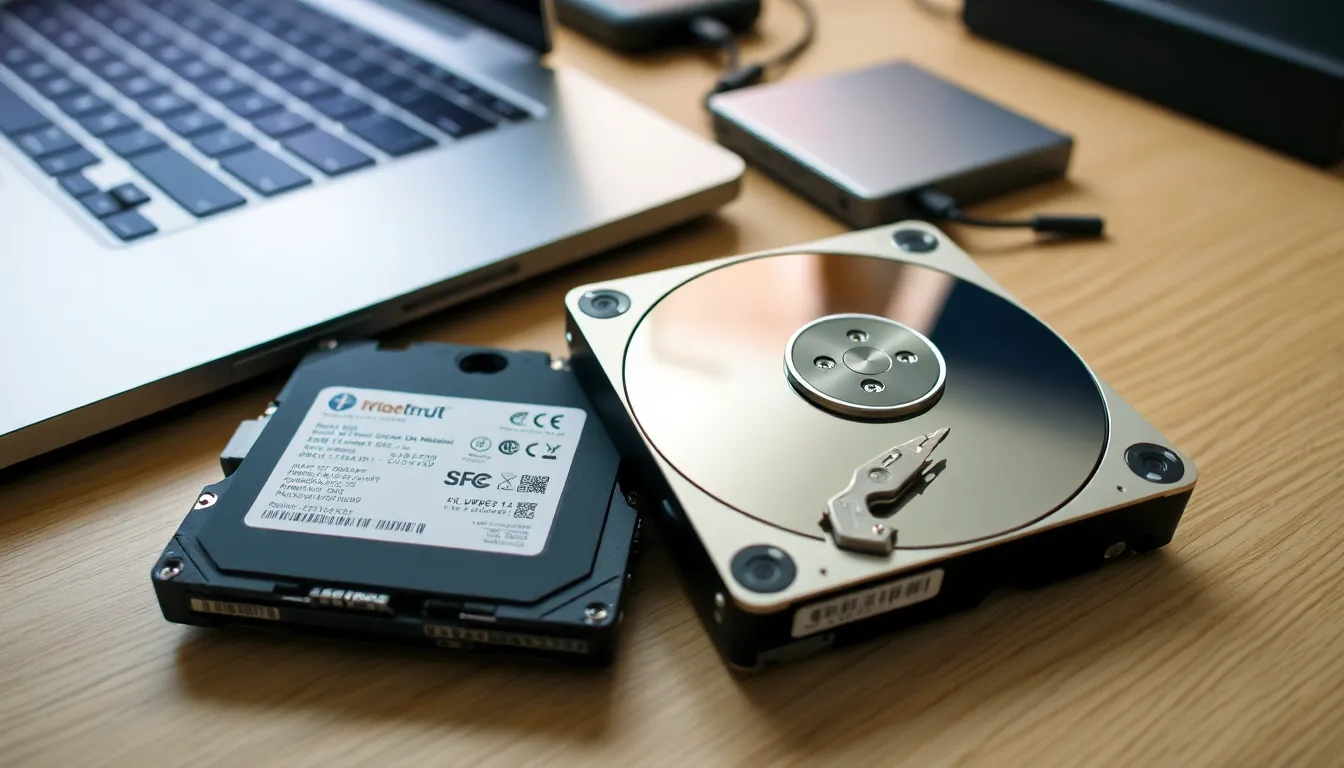Table of Contents
ToggleIn a world where selfies and cat videos reign supreme, the question of how much 1TB of storage really is becomes more crucial than ever. Imagine the sheer volume of data you could hoard—thousands of photos, countless movies, and enough memes to keep you entertained for a lifetime. But before diving into the digital treasure chest, it’s essential to understand what that 1TB actually means for your devices and your wallet.
Understanding Storage Capacity
Understanding data storage requires recognizing how much a terabyte (TB) represents. A single terabyte equals approximately 1,000 gigabytes (GB). This substantial capacity allows for the storage of around 250,000 photos taken with a smartphone. Storing 500 hours of HD video becomes a reality, making a TB ideal for media enthusiasts.
Different devices handle storage differently. External hard drives, laptops, and cloud storage options often provide various capacities. Choices frequently depend on user needs, such as backing up data or increasing device memory. Costs vary. A 1TB external hard drive generally ranges from $50 to $100, depending on brand and speed.
Data storage implications go beyond capacity. Costs associated with larger storage options, especially cloud services, can add up. Monthly fees for cloud storage plans offering 1TB often range from $10 to $20. Evaluating a budget in relation to data needs becomes essential for informed decisions.
Accessible tools can help users manage storage effectively. File organizers and monitoring applications can indicate when storage nears full capacity. Prioritizing data management optimizes available space and reduces costs associated with unnecessary storage upgrades.
Making the right decision about 1TB storage involves assessing personal data usage and future needs. Users often benefit from understanding how much data their devices generate. This awareness helps users choose appropriate storage solutions that suit their digital lifestyle.
Factors Influencing Storage Prices

Prices for storage can vary significantly based on several factors. Understanding how these elements affect costs helps in making informed decisions.
Type of Storage Devices
Different storage devices come with varying price points. Solid-state drives (SSDs) typically cost more than traditional hard disk drives (HDDs) due to their speed and reliability. HDDs might range from $50 to $100 for 1TB, while SSDs can reach $100 or more for the same capacity. Cloud storage also presents monthly fees, often between $10 and $20, offering flexibility without the need for physical hardware. Selecting the appropriate type of storage aligns the user’s needs with their budget.
Brand Reputation
Brand reputation plays a critical role in storage pricing. Well-known brands consistently command higher prices due to their reliability and customer support. For instance, brands like Western Digital and Seagate offer recognized external drives, often priced at a premium. In contrast, lesser-known brands can provide similar capacities but may seem less trustworthy to some customers. Investing in a reputable brand often reduces the risk of data loss and enhances overall user satisfaction.
Current Market Prices for 1TB Storage
Understanding the current market prices for 1TB storage aids in making informed decisions. Prices vary based on storage type and device.
SSD vs HDD Pricing
Solid-state drives (SSDs) generally come at a premium compared to traditional hard disk drives (HDDs). An average 1TB SSD can exceed $100, reflecting its speed and reliability. In contrast, 1TB HDDs typically fall within the $50 to $100 range, showcasing a more budget-friendly option. Choosing between these two often revolves around balancing performance needs and cost considerations. While SSDs provide faster access times and durability, HDDs offer a more economical solution for those prioritizing capacity over speed.
External vs Internal Drives
Pricing also shifts between external and internal drives. External hard drives for 1TB can range from $50 to $100, enabling portability and easy access. Internal drives, however, often provide more competitive pricing, usually aligning with HDD costs. Those looking to upgrade or build their PCs may find internal drives more cost-effective in certain configurations. Additionally, the decision between external and internal storage hinges on storage needs and physical space constraints in devices.
Where to Buy 1TB Storage
Finding 1TB storage options involves exploring both online retailers and physical stores. Budget, brand preference, and device compatibility play crucial roles in deciding where to purchase.
Online Retailers
Online retailers like Amazon, Newegg, and Best Buy offer a variety of 1TB storage solutions. These platforms often feature competitive pricing, user reviews, and detailed product descriptions. Customers can find external hard drives ranging from $50 to $100 and SSDs typically priced over $100. Most online retailers provide discounts during sales events, making it easier to secure deals for budget-conscious shoppers. Fast shipping options enhance convenience, allowing users to receive products quickly.
Physical Stores
Physical stores such as Walmart, Target, and local electronics shops provide immediate access to 1TB storage devices. Walk-in customers can physically inspect products and consult staff for recommendations. Pricing in these stores often aligns with online averages, with external hard drives priced between $50 and $100. Display models allow for hands-on experience, aiding in device selection. Local retailers may also offer clearance items, providing budget-friendly options for discerning buyers who prefer shopping in person.
Understanding the value of 1TB of storage is essential in today’s data-driven world. With the ability to hold vast amounts of media it caters to both casual users and professionals alike. As individuals evaluate their storage needs they must consider factors like device type and budget to make informed choices.
Investing in the right storage solution can significantly enhance one’s digital experience. Whether opting for external hard drives or cloud storage plans the decision should align with personal usage patterns. By staying aware of market trends and pricing individuals can find the best options to suit their needs while maximizing their storage potential.




